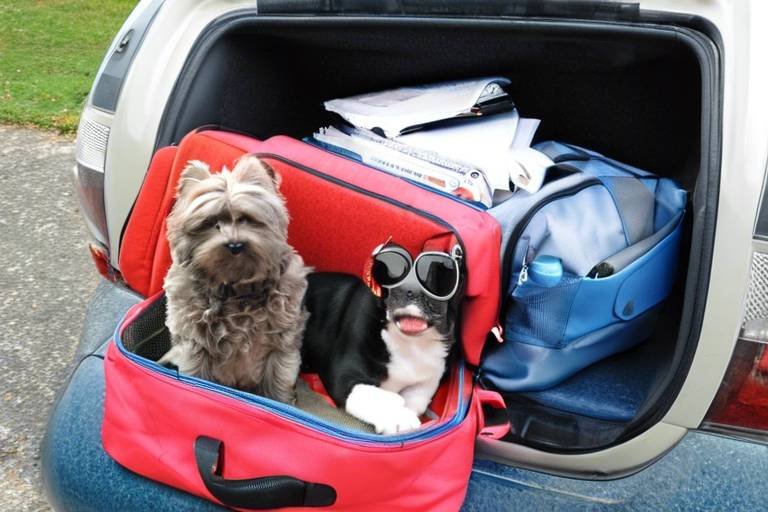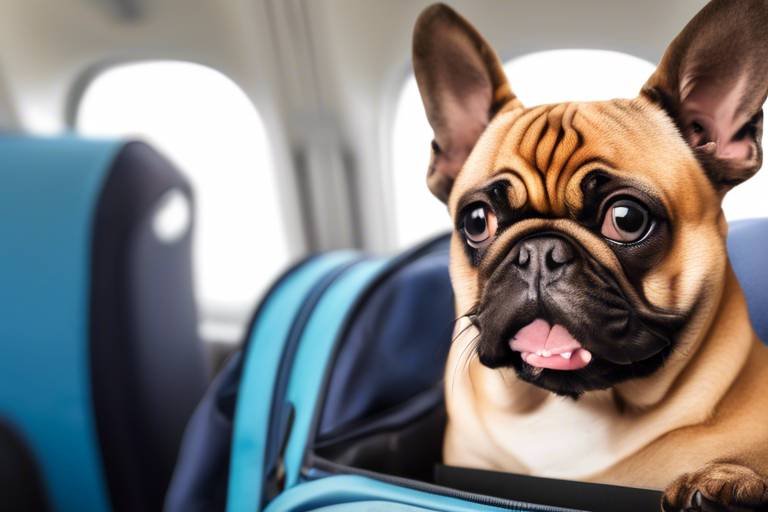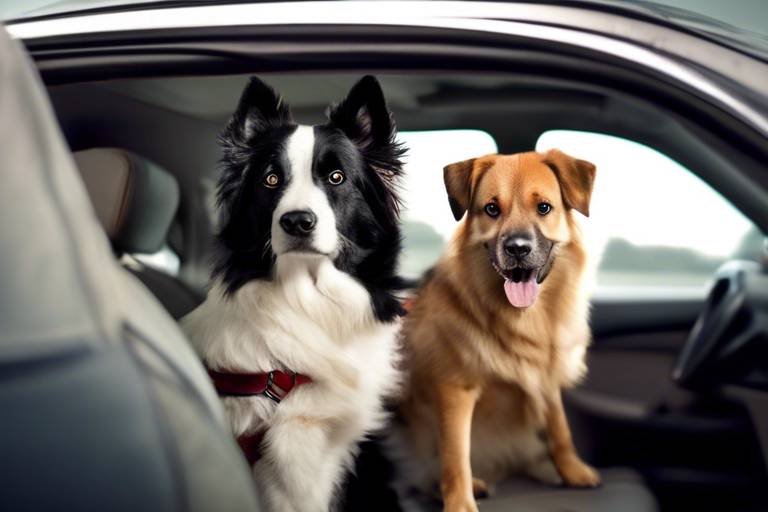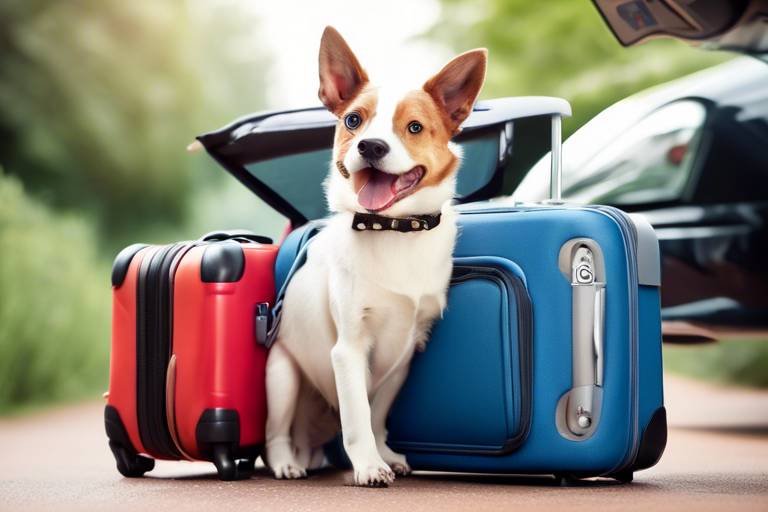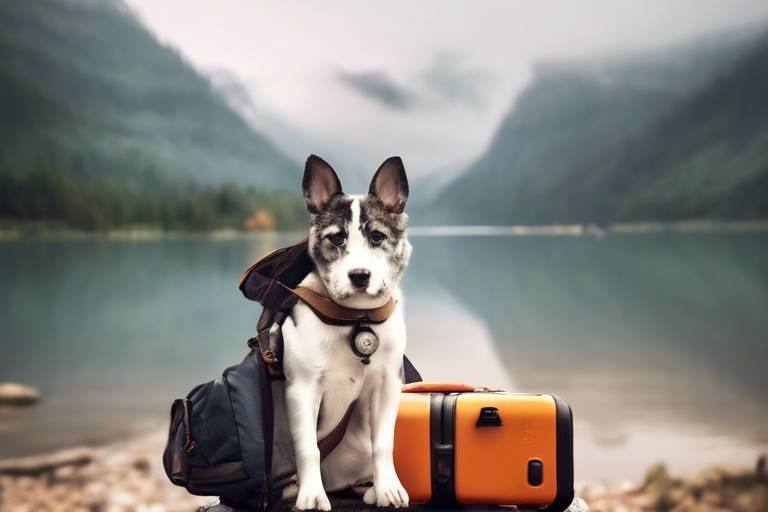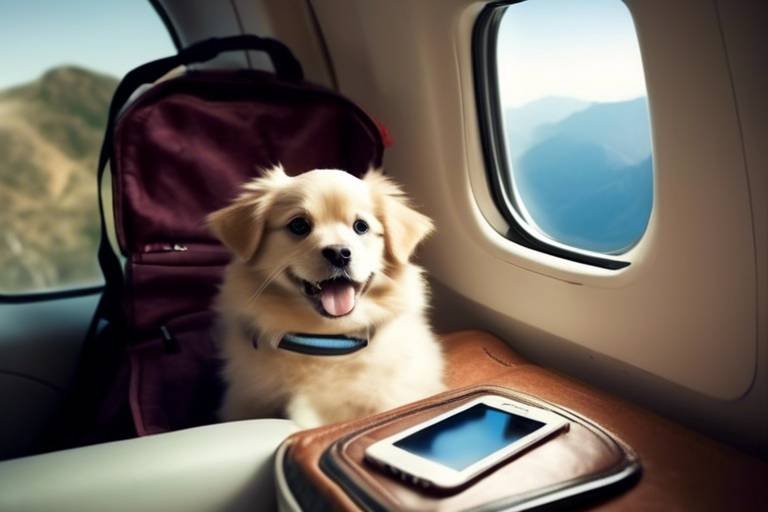Traveling with Pets - A Guide to Global Regulations
Traveling with your furry friends can be one of the most rewarding experiences, but it also comes with its fair share of challenges. Whether you're planning a vacation, moving abroad, or just visiting family, understanding the global regulations regarding pet travel is essential. It's not just about packing their favorite toys and treats; it’s about ensuring that you comply with various laws and requirements that vary from one country to another. This guide aims to equip you with the knowledge needed to navigate the complex world of pet travel regulations, so both you and your pet can enjoy a smooth and hassle-free journey.
Navigating the complexities of pet travel regulations is crucial for any pet owner. Different countries have their own rules regarding which pets are allowed, the documentation required, and health checks that must be performed before travel. For example, some countries may only allow pets to enter if they have been vaccinated against certain diseases, while others may require a quarantine period upon arrival. It’s vital to do your research well in advance of your trip. Make sure to check the official government websites or consult with your veterinarian to understand what you need to prepare for your specific destination.
Health certificates and vaccinations are vital for pet travel. Most countries require pets to have specific vaccinations, such as rabies, and a health certificate issued by a licensed veterinarian. This certificate typically confirms that your pet is in good health and free from contagious diseases. Make sure to schedule a vet visit well before your travel date to ensure that all vaccinations are up to date. The timing of vaccinations can be critical; some countries require that vaccinations be administered a certain number of days before travel. Always keep a copy of your pet's vaccination records and health certificates handy, as you may need to present them during your journey.
Microchipping is increasingly becoming a requirement for pet travel. This small chip, implanted under your pet's skin, contains a unique identification number that can be scanned by veterinarians or animal shelters. Many countries now mandate microchipping as a way to ensure that lost pets can be returned to their owners. Additionally, microchipping provides a permanent form of identification, which is especially important when traveling internationally. Be aware that the regulations surrounding microchipping can vary; some countries require microchips to be ISO 11784/11785 compliant, while others may have different standards. Always check the requirements for your destination country.
Each airline has specific policies regarding pet travel, which can vary widely. Some airlines allow pets in the cabin, while others may require them to travel in the cargo hold. It's essential to review the airline's pet policy before booking your tickets. Common considerations include:
- Carrier Requirements: Most airlines require pets to be transported in an airline-approved carrier. Ensure that the carrier is well-ventilated and spacious enough for your pet to stand, turn around, and lie down comfortably.
- Fees: Be prepared for additional fees for traveling with your pet, which can vary significantly between airlines.
- Travel Options: Some airlines offer special programs for pets, including dedicated pet cabins or services. Research your options to find what works best for you and your pet.
Traveling by land can present different challenges compared to air travel. Whether you're hitting the road in your car or taking a train, it's important to familiarize yourself with the regulations that govern land travel with pets. Always make sure your pet is secured in the vehicle, either in a carrier or with a seatbelt harness designed for pets. Take regular breaks during long journeys to allow your pet to stretch their legs and relieve themselves. Additionally, check if your destination has any specific regulations regarding pet travel, such as leash laws or breed restrictions.
Finding suitable accommodations is essential when traveling with pets. Not all hotels or rentals are pet-friendly, so it’s crucial to do your homework ahead of time. Websites like BringFido or Airbnb allow you to filter your search for pet-friendly options. When booking, always double-check the hotel’s pet policy, including any associated fees or restrictions on the number or size of pets allowed. Some places may also have designated areas for pets, so be sure to inquire about those amenities.
Understanding customs regulations is vital for pet travel. Each country has its own customs procedures for pets, which can include inspections and documentation checks. Be prepared to present health certificates, vaccination records, and any other required paperwork at customs checkpoints. Failure to comply with these regulations can result in delays or even refusal of entry for your pet. Always have multiple copies of your documentation and keep them organized for easy access during your travels.
Traveling with exotic pets involves additional regulations. If you’re considering bringing along a reptile, bird, or other exotic animal, be aware that many countries have strict laws regarding their importation. This can include requiring specific permits, health documentation, and sometimes even quarantine periods. It’s crucial to research the regulations for your particular species and destination, as failing to do so could result in confiscation or fines.
Preparation is key to a successful pet travel experience. Here are some practical tips to ensure a smooth journey:
- Pack Essentials: Bring along food, water, bowls, leashes, waste bags, and any medications your pet may need.
- Comfort Matters: Make sure your pet is comfortable in their carrier or vehicle. Consider familiar toys or blankets to help ease anxiety.
- Stay Calm: Pets can pick up on their owner's stress. Keeping a calm demeanor will help your pet feel more secure during the trip.
Q1: What documents do I need to travel with my pet?
A1: You typically need a health certificate, vaccination records, and possibly a microchip registration. Always check the specific requirements for your destination.
Q2: Can I take my pet on a plane?
A2: Yes, many airlines allow pets to travel in the cabin or cargo hold, but policies vary. Always check with your airline for their specific regulations.
Q3: Are there restrictions on certain breeds?
A3: Some countries and airlines have restrictions on specific breeds, especially those considered dangerous. Check the regulations beforehand.
Q4: What should I do if my pet gets anxious during travel?
A4: Consider consulting your veterinarian for advice on calming aids or strategies to help your pet feel more at ease.

Understanding Pet Travel Regulations
Traveling with your furry friend can be one of the most rewarding experiences, but it comes with its own set of challenges. Understanding pet travel regulations is crucial to ensure a smooth journey for both you and your pet. Different countries have various rules regarding pet entry, and these can change frequently. Therefore, it’s essential to do your homework before you embark on your adventure. Imagine arriving at your dream destination only to find out your pet can’t enter because of missing paperwork—talk about a nightmare!
First and foremost, you’ll need to familiarize yourself with the specific regulations of the country you are visiting. Most countries require certain documentation to prove that your pet is healthy and has been vaccinated against common diseases. This may include:
- Health Certificate: A document issued by a licensed veterinarian confirming that your pet is healthy and fit for travel.
- Vaccination Records: Proof that your pet has received the necessary vaccinations, especially rabies, within a specified timeframe.
- Import Permits: Some countries require an import permit for pets, which may need to be applied for in advance.
In addition to these documents, it’s important to check if there are any specific breed restrictions or quarantine requirements in the destination country. For example, certain breeds may be banned or face additional scrutiny. It’s like trying to navigate a maze—one wrong turn, and you could be facing delays or even the possibility of having to leave your pet behind.
Keep in mind that regulations can vary not only by country but also by region within a country. For example, traveling within the European Union is generally easier due to harmonized pet travel regulations, but you still need to check the specific rules for each member state. In contrast, traveling to countries like Australia or New Zealand can be more complicated, as they have strict biosecurity laws to protect their ecosystems.
To make your life easier, consider creating a checklist of the documents and requirements for your destination. This way, you can ensure you have everything in order before you leave. Here’s a simple table to help you visualize what you might need:
| Document | Description | Required by Country |
|---|---|---|
| Health Certificate | Proof of your pet's health status | Most countries |
| Vaccination Records | Proof of vaccinations, especially rabies | Most countries |
| Import Permit | Permission to bring your pet into the country | Some countries |
| Microchip Information | Details of your pet's microchip | Some countries |
Lastly, always keep in mind that regulations can change unexpectedly. Therefore, it’s wise to check the official government websites or contact the consulate of your destination country for the most current information. This proactive approach will help you avoid any unpleasant surprises at the airport or border.
Q: What if my pet doesn’t have a health certificate?
A: Most countries will not allow entry without a valid health certificate, so it’s essential to get one from your veterinarian before traveling.
Q: Are there specific airlines that are better for traveling with pets?
A: Yes, some airlines have more accommodating policies for pet travel, including dedicated pet cabins and better handling procedures. Always check the airline’s pet policy before booking.
Q: Can I travel with my pet to any country?
A: No, each country has its own regulations regarding pet entry. Some may have breed restrictions or quarantine requirements, so it’s crucial to research beforehand.

Health Certificates and Vaccinations
When it comes to traveling internationally with your furry friend, health certificates and vaccinations are not just bureaucratic hurdles—they're essential for ensuring your pet's safety and well-being. Imagine planning a dream vacation, only to be turned away at the border because your pet isn’t up to date on their shots! That’s a nightmare scenario for any pet owner. So, let’s dive into what you need to know about these crucial documents.
First off, a health certificate is a document issued by a licensed veterinarian. It confirms that your pet is healthy and free from contagious diseases. Most countries require this certificate, especially if you’re flying or crossing borders. The certificate typically needs to be issued within a specific time frame before travel—often within 10 days. It's like getting a last-minute check-up before a big trip; you want to make sure everything is in tip-top shape!
Now, let’s talk about vaccinations. Different countries have different requirements, but some common vaccines include:
- Rabies: Almost universally required for dogs and cats. It’s a serious disease, and many countries won’t let your pet in without proof of vaccination.
- Distemper: Essential for dogs; some places require proof of this vaccination as well.
- Feline Leukemia: Important for cats, especially if they’ll be around other felines.
It’s crucial to check the specific vaccination requirements for your destination country well in advance. Some countries may require vaccinations to be administered a certain number of days before travel, while others may have additional vaccines on their list. It’s like packing your bags: you don’t want to forget anything important!
But wait, there’s more! Some countries may also require a titers test, which measures the level of antibodies in your pet's blood. This is particularly common for rabies. If your pet’s levels are adequate, you can travel without having to repeat the vaccination. Think of it as a report card for your pet's immune system—showing that they’re ready for the journey ahead!
To make your preparation process a little easier, here’s a quick table summarizing general vaccination requirements for popular destinations:
| Country | Required Vaccinations | Health Certificate |
|---|---|---|
| United States | Rabies (for dogs and cats) | Yes |
| Canada | Rabies | Yes |
| United Kingdom | Rabies, Distemper (dogs) | Yes |
| Australia | Rabies, other vaccines may be required | Yes |
In conclusion, securing the right health certificates and vaccinations for your pet is not just a legal requirement; it’s a vital part of making sure your journey is smooth and stress-free. Always consult your veterinarian well ahead of your travel date to ensure that your pet meets all the necessary health requirements. After all, a well-prepared pet is a happy pet!
And remember, it’s not just about getting the paperwork done; it’s about ensuring your beloved companion has a safe and enjoyable adventure alongside you. So, check those vaccination records, schedule that vet appointment, and get ready for a fantastic trip together!

Microchipping Your Pet
When it comes to traveling with your furry friend, microchipping is not just a trendy buzzword; it’s a vital step in ensuring their safety and security. Imagine this: you’re in a foreign country, enjoying the sights, and suddenly your pet slips away. Panic sets in, but if your pet is microchipped, there’s a much higher chance of reuniting with them. Microchips serve as a permanent form of identification, providing a unique ID number that links your pet to your contact information.
Many countries have made microchipping a requirement for pets entering their borders. This means that not only is it a good idea for your pet’s safety, but it can also be a legal requirement. So, what exactly is microchipping? It involves implanting a tiny chip, about the size of a grain of rice, under your pet’s skin. This chip contains a unique identification number that can be scanned by a veterinarian or animal shelter, allowing them to access your contact details stored in a database.
Here are some key points to consider regarding microchipping:
- Permanent Identification: Unlike collars or tags that can fall off, microchips stay with your pet for life.
- Quick and Painless: The procedure is quick, similar to a vaccination, and your pet will hardly notice it.
- Global Recognition: Most countries recognize microchips, making it easier for your pet to travel internationally.
Before you travel, ensure that your pet’s microchip is registered with up-to-date contact information. It’s a good idea to double-check the registration details with the microchip company. Some countries might require specific types of microchips, so it's essential to research the regulations of your destination. For instance, the European Union mandates that pets must be microchipped before their rabies vaccination, while other countries might have different rules.
In addition to the legal aspects, microchipping provides peace of mind. You can enjoy your travels knowing that if your pet gets lost, they have a better chance of being found. It’s like giving your pet a little insurance policy, one that ensures they can be returned to you no matter where they are in the world.
So, as you prepare for your next adventure, don’t overlook this crucial step. Microchipping your pet is not just a precaution; it’s an essential part of responsible pet ownership that can make all the difference in keeping your beloved companion safe.
Here are some common questions pet owners have about microchipping:
- Does microchipping hurt? - The process is quick and causes minimal discomfort, similar to a routine vaccination.
- How long does a microchip last? - Microchips are designed to last a lifetime, though it’s good practice to check them regularly.
- Can I travel with my pet if they are not microchipped? - It depends on the regulations of your destination country. Many places require microchipping.

Airline Policies for Pet Travel
When it comes to traveling with your furry friends, understanding airline policies is essential for a smooth journey. Each airline has its own set of rules and regulations regarding pet travel, which can sometimes feel like navigating a maze. Before you book your flight, it’s crucial to research and familiarize yourself with the specific requirements of the airline you choose. This not only ensures compliance but also helps you avoid any last-minute surprises that could derail your plans.
Most airlines allow pets to travel either in the cabin or as checked baggage. If your pet is small enough to fit in a carrier under the seat, they can typically travel with you in the cabin. However, larger pets may need to be transported in the cargo hold. It's important to note that each airline has its own weight and size restrictions for pets traveling in the cabin. For instance, a common requirement is that your pet must weigh no more than 15-20 pounds including the carrier. Therefore, checking the airline's specific guidelines is vital.
In addition to size restrictions, airlines often have specific carrier requirements. Your pet's carrier must be well-ventilated, secure, and spacious enough for your pet to stand, turn around, and lie down comfortably. Some airlines provide detailed specifications regarding the dimensions and materials of the carrier. Here’s a quick overview of what you might encounter:
| Airline | In-Cabin Pet Weight Limit | Carrier Dimensions (L x W x H) |
|---|---|---|
| Airline A | 15 lbs | 18" x 11" x 11" |
| Airline B | 20 lbs | 17" x 12" x 7" |
| Airline C | 15 lbs | 19" x 12" x 10" |
Moreover, be aware of the fees associated with pet travel. Airlines typically charge a fee for pets traveling in the cabin, which can range from $75 to $200 depending on the airline and destination. For pets traveling in cargo, the fees can be significantly higher, sometimes reaching up to $500. Always confirm these costs beforehand to avoid any unexpected charges at the airport.
Another critical aspect to consider is the health documentation required by airlines. Most airlines will ask for proof of vaccinations and a health certificate issued by a veterinarian within a certain timeframe before travel. This is to ensure the safety of all passengers, including your pet. Be sure to check the specific health requirements mandated by the airline and the destination country, as these can vary significantly.
Lastly, remember that some airlines have restrictions on pet travel during certain seasons, especially during extreme weather conditions. For example, if you’re traveling during the summer months, airlines may refuse to transport pets in cargo due to high temperatures. It’s always a good idea to check the airline’s policy on seasonal restrictions, as this could affect your travel plans.
In summary, traveling with your pet by air can be a delightful experience if you’re well-prepared. By understanding the airline policies, including weight limits, carrier requirements, fees, health documentation, and seasonal restrictions, you can ensure a hassle-free journey for both you and your beloved pet.
- What documents do I need to travel with my pet? Most airlines require a health certificate and proof of vaccinations.
- Can I take my pet in the cabin with me? Yes, if they meet the size and weight restrictions set by the airline.
- Are there additional fees for traveling with pets? Yes, airlines typically charge a fee for pets traveling in the cabin or cargo.
- What should I do if my pet has anxiety while traveling? Consider consulting your vet for advice on calming strategies or medications.

Traveling by Land with Pets
Traveling by land with your furry friend can be an adventure filled with excitement and bonding moments. However, it comes with its own set of challenges and regulations that you must navigate to ensure a smooth journey. Whether you're hitting the open road in your car, taking a scenic train ride, or even hopping on a bus, understanding the rules and preparing adequately can make all the difference. So, what should you keep in mind when planning your land travel with pets?
First and foremost, it’s essential to check the specific regulations for pets in the areas you plan to travel through. Different states and countries may have varying laws regarding pet travel, including leash laws, breed restrictions, and even pet-friendly zones. For example, some national parks allow pets only in designated areas, while others may prohibit them altogether. Always do your homework before you hit the road!
Next, consider your pet's comfort and safety during the journey. Here are some practical tips to keep in mind:
- Frequent Breaks: Plan to take regular breaks during your trip. This allows your pet to stretch their legs, relieve themselves, and hydrate. A good rule of thumb is to stop every 2-3 hours for a quick break.
- Secure Your Pet: Use a pet seatbelt or a carrier to keep your pet secure while the vehicle is in motion. This not only keeps them safe but also minimizes distractions for the driver.
- Pack Essentials: Bring along food, water, bowls, a leash, waste bags, and any medications your pet may need. Having a travel kit ready can save you from scrambling at the last minute.
Moreover, if you're traveling via train or bus, check the transportation provider's policies regarding pets. Some companies allow pets in carriers, while others may have size restrictions or require advance notice. Be sure to book your tickets accordingly and confirm any fees associated with bringing your pet along.
In addition to regulations, consider the climate and environment you’ll be traveling through. For instance, if you're driving through a hot area, ensure your vehicle is well-ventilated and never leave your pet alone inside the car, as temperatures can rise rapidly. Similarly, if you're traveling during colder months, make sure your pet is warm and comfortable, especially if they are not accustomed to low temperatures.
Finally, always carry a health certificate for your pet, especially if you’re crossing state or national borders. This document proves that your pet is healthy and up-to-date on vaccinations, which can be crucial if you encounter any regulations or checkpoints along your route.
In summary, traveling by land with pets can be a delightful experience if you prepare adequately. By understanding regulations, ensuring comfort, and packing the essentials, you can create lasting memories on the road with your four-legged companion. So, buckle up, enjoy the journey, and make every mile count!
Q: Can I take my pet on public transportation?
A: Yes, many public transportation systems allow pets, but regulations vary. Always check the specific policies of the service you plan to use.
Q: How can I keep my pet calm during long road trips?
A: Regular breaks, familiar toys, and calming treats can help ease your pet's anxiety. Consider playing soft music to create a soothing environment.
Q: Are there any specific health requirements for my pet when traveling?
A: Many states and countries require a health certificate and proof of vaccinations. Always check local regulations before traveling.

Pet-Friendly Accommodations
Finding suitable can make or break your travel experience. Imagine arriving at a beautiful destination only to find out that your furry friend is not welcome. It can be a real downer! Therefore, it's crucial to do your homework before booking a place to stay. Many hotels, motels, and vacation rentals now cater specifically to pet owners, but the rules and regulations can vary significantly from one location to another.
When searching for pet-friendly options, consider factors such as size restrictions, breed limitations, and any additional fees that may apply. Some places might charge a non-refundable pet deposit or a nightly fee, while others might offer complimentary pet amenities like bowls and treats. It's a good idea to read the fine print and contact the accommodation directly for clarification. After all, you wouldn't want any surprises upon arrival!
Here are some tips to help you identify the right pet-friendly accommodations:
- Use Specialized Websites: Websites like BringFido or PetFriendlyHotels allow you to filter your search specifically for pet-friendly hotels, making it easier to find the perfect spot.
- Read Reviews: Check out reviews from other pet owners. They can provide valuable insights into how accommodating a place truly is.
- Call Ahead: Once you've narrowed down your options, give the hotel a call. Ask about their pet policies and any amenities they offer. This can also help you gauge their customer service.
Additionally, consider the location of your accommodation. Is it near parks, beaches, or pet-friendly attractions? This can greatly enhance your travel experience, allowing your pet to enjoy the trip just as much as you do. For instance, a hotel near a dog park can be a fantastic way for your pet to stretch their legs after a long journey.
Some popular chains known for being pet-friendly include:
| Hotel Chain | Pet Policy | Fees |
|---|---|---|
| La Quinta Inn & Suites | Pets stay free | No fees |
| Best Western | Pet-friendly rooms available | Varies by location |
| Marriott | Pet-friendly options | Up to $100 fee |
Remember, while many places welcome pets, some may have restrictions based on the size or breed of your furry companion. Always double-check before making any reservations to avoid any last-minute hiccups. By planning ahead, you can ensure that both you and your pet have a comfortable and enjoyable stay during your travels.
Q: Are all hotels pet-friendly?
A: No, not all hotels accept pets. It's essential to check the pet policy of each hotel before making a reservation.
Q: What should I do if my pet has special needs?
A: When searching for accommodations, be sure to inquire about any specific needs your pet may have, such as accessibility features or dietary requirements.
Q: Can I leave my pet alone in the hotel room?
A: Policies vary by hotel, but many do not allow pets to be left unattended in rooms. It's best to check with the hotel directly.

Customs Regulations for Pets
When it comes to traveling with your furry friend, understanding customs regulations is absolutely essential. Different countries have varying rules regarding the entry of pets, and being unaware of these can lead to unexpected delays or, worse, your pet being denied entry. Imagine arriving at your destination, only to find out that your beloved companion is stuck in quarantine because you didn’t have the right paperwork. Yikes! To avoid such scenarios, it’s crucial to do your homework beforehand.
First and foremost, most countries require specific documentation for pets entering their borders. This typically includes a valid health certificate issued by a licensed veterinarian, proof of vaccinations, and sometimes even a microchip identification. But don’t just stop there; each country has its own quirks and requirements. For instance, some nations may require a rabies vaccination to be administered within a certain timeframe before travel. To keep things simple, here’s a quick overview of what you might need:
| Country | Health Certificate | Vaccination Requirements | Microchip |
|---|---|---|---|
| United States | Yes | Rabies (if over 3 months) | Recommended |
| United Kingdom | Yes | Rabies (administered at least 21 days prior) | Mandatory |
| Australia | Yes | Rabies (administered at least 21 days prior) | Mandatory |
| Canada | Yes | Rabies (if over 3 months) | Recommended |
In addition to the necessary documentation, you should also be prepared for the possibility of customs inspections. Upon arrival, customs officials may want to check your pet’s documentation, health status, and sometimes even their behavior. It’s like a mini audition for your pet! So, make sure your pet is well-behaved and calm during this process. A friendly demeanor can go a long way in ensuring a smooth entry.
Moreover, some countries may have specific quarantine regulations. For instance, if your pet doesn't meet the health requirements, they may have to stay in quarantine until they are cleared. This can vary from a few hours to several days, depending on the country’s regulations and your pet's health status. Always check the official government website of the destination country for the most accurate and up-to-date information regarding pet entry regulations.
Finally, remember that preparation is key. Gather all necessary documents well in advance and keep them organized. Consider using a travel folder specifically for your pet’s paperwork. This way, when you reach customs, you can easily present everything in one go, making the process smoother and faster. After all, who wants to spend their first moments in a new country dealing with paperwork? Not you or your pet!
- What should I do if I forget my pet's health certificate? - It's crucial to have this document on hand. If you forget it, contact your veterinarian immediately to obtain a copy, but be aware that some countries may not allow entry without it.
- Can I travel with my pet without a microchip? - Some countries allow it, but many require a microchip for identification. It's always best to check the regulations of your destination.
- How can I prepare my pet for customs inspections? - Get your pet used to being handled by strangers and practice calm behaviors. A well-trained pet will make the process easier for everyone.

Traveling with Exotic Pets
Traveling with exotic pets can feel like embarking on a thrilling adventure, but it also comes with its own set of challenges. Unlike dogs or cats, exotic pets—such as reptiles, birds, or small mammals—often have specific needs and regulations that must be adhered to when crossing borders. So, what should you know before taking your exotic companion on a journey? Buckle up, because we’re diving into the world of exotic pet travel!
First and foremost, it's essential to understand that different countries have varying regulations regarding the importation of exotic animals. Some countries may require special permits, while others might outright ban certain species. For example, if you’re planning a trip to Australia, be prepared to face strict biosecurity laws, as they prohibit many exotic pets from entering the country. It’s crucial to research your destination's regulations well in advance to avoid any unpleasant surprises at customs.
One of the key documents you'll need is a health certificate, which is often required to prove that your pet is free from diseases. This certificate should be issued by a licensed veterinarian and may need to include details about your pet’s vaccinations. For exotic pets, specific vaccinations or treatments may be mandated, depending on the species. For instance, some countries require a rabies vaccination for certain mammals, even if they are not typically considered rabies carriers.
In addition to health certifications, microchipping your exotic pet is becoming a common requirement. Microchips serve as a permanent form of identification and can be invaluable if your pet gets lost during your travels. Not only does it enhance your pet's safety, but it also helps meet the legal requirements of many countries. Make sure to check the specific microchipping regulations for your destination, as they can vary significantly.
When it comes to transportation, airlines and other travel providers often have their own rules for exotic pets. Many airlines will require that your pet is transported in an approved carrier that meets specific size and ventilation standards. Additionally, some airlines may only allow certain species on board, while others might require that exotic pets be transported in the cargo hold. Always check the airline's pet policy well in advance and consider contacting them directly to clarify any doubts.
While it’s important to comply with regulations, it’s equally vital to ensure your exotic pet is comfortable during the journey. Here are a few tips to help make the trip smoother:
- Familiarize your pet with their carrier before the trip.
- Pack essential supplies, including food, water, and any special items your pet may need.
- Plan for regular breaks if traveling by land to allow your pet to stretch and hydrate.
Lastly, don’t forget about accommodations! Not all hotels or rental properties are equipped to welcome exotic pets. When searching for a place to stay, look for pet-friendly options that specifically mention acceptance of exotic animals. Read reviews and reach out to the property owners to confirm their policies regarding your specific type of pet.
Traveling with exotic pets can be a rewarding experience, filled with unique memories and adventures. However, it requires a bit of extra planning and attention to detail. By understanding the regulations, preparing the necessary documentation, and ensuring your pet's comfort, you can embark on a journey that is not only enjoyable for you but also safe for your beloved exotic companion.
Q: What documents do I need to travel with my exotic pet?
A: Generally, you will need a health certificate, vaccination records, and possibly a microchip registration. Check the specific requirements for your destination country.
Q: Can I take my exotic pet on a plane with me?
A: This depends on the airline's policies. Some airlines allow certain exotic pets in the cabin, while others may require them to travel in the cargo hold. Always check with the airline beforehand.
Q: What should I do if my exotic pet gets sick while traveling?
A: Always have a plan in place. Research veterinary services at your destination and carry a basic pet first aid kit. It’s also wise to have your vet’s contact information handy in case of emergencies.
Q: Are there any species that are banned from travel?
A: Yes, many countries have specific bans on certain exotic species. Always check the regulations of your destination to ensure your pet is allowed to enter.

Tips for a Smooth Journey
Traveling with your furry friend can be an exhilarating adventure, but it also comes with its own set of challenges. To ensure that both you and your pet have a stress-free experience, it's essential to be well-prepared. First and foremost, planning ahead is key. Make a checklist of everything you’ll need, from food and water to toys and bedding. This will help you avoid last-minute scrambles and ensure that your pet feels comfortable and secure during the journey.
One of the most important aspects of traveling with pets is keeping them comfortable. If you're flying, consider investing in a high-quality pet carrier that meets airline regulations. Your pet should have enough space to stand, turn around, and lie down comfortably. If you’re traveling by car, make frequent stops to let your pet stretch their legs and relieve themselves. Remember, a tired pet is a happy pet, so incorporating playtime during breaks can significantly improve their mood.
Another crucial tip is to stay hydrated. Just like humans, pets can become dehydrated, especially during long trips. Always carry a portable water bowl and offer your pet water regularly. If you're traveling by air, check the airline's regulations regarding pet hydration and feeding. Some airlines may have specific guidelines on when to feed your pet before the flight.
In addition to comfort and hydration, it’s essential to think about your pet’s safety. Always use a safety harness or a pet seatbelt in the car to prevent any accidents. If you're flying, make sure your pet is microchipped and wearing a collar with an ID tag that includes your contact information. This way, if you and your pet get separated, the chances of being reunited are much higher.
Lastly, don’t forget about your pet’s emotional well-being. Traveling can be stressful for pets, so bringing familiar items from home can help ease their anxiety. Whether it’s their favorite blanket, a toy, or even a piece of your clothing, these comforting items can make a world of difference. And remember, patience is key. Your pet may need some time to adjust to new environments, so be prepared to offer them reassurance and love throughout the journey.
Here are some common questions pet owners have when traveling with their pets:
- What should I do if my pet gets anxious during travel? Consider using calming products, such as anxiety wraps or pheromone sprays. Additionally, consult your vet about possible medications for severe anxiety.
- Can I travel with my pet in the cabin of the plane? Many airlines allow small pets in the cabin, but it’s essential to check their specific policies and book in advance.
- How can I find pet-friendly accommodations? Websites like BringFido and Airbnb often have filters for pet-friendly options, making it easier to find suitable places to stay.
- What are the best ways to keep my pet entertained during long trips? Bring along toys, chew items, and consider interactive games to keep your pet engaged and distracted during the journey.
Frequently Asked Questions
- What documents do I need to travel with my pet?
When traveling with your pet, you typically need a health certificate issued by a veterinarian, proof of vaccinations, and sometimes a pet passport. It's essential to check the specific requirements of your destination country, as they can vary significantly.
- Are there specific vaccinations required for pets?
Yes, many countries require pets to be vaccinated against rabies and other diseases. It's crucial to have your pet's vaccination records up to date and to verify the specific vaccination requirements of the country you are traveling to.
- What is microchipping, and is it necessary for pet travel?
Microchipping involves implanting a small chip under your pet's skin that contains identification information. Many countries require pets to be microchipped for identification purposes, especially in case they get lost during travel.
- How can I find out an airline's pet travel policies?
You can find an airline's pet travel policies on their official website or by contacting their customer service. Each airline has different regulations regarding pet carriers, fees, and travel methods, so it's vital to check this information before booking your flight.
- What should I consider when traveling by land with my pet?
When traveling by land, consider your pet's comfort and safety. Make sure to take breaks for bathroom and exercise needs, and ensure your pet is secured in a carrier or harness during the journey. Also, check the regulations for any states or countries you may pass through.
- How can I find pet-friendly accommodations?
To find pet-friendly accommodations, use websites that specialize in pet-friendly listings or filter search results on hotel booking platforms. Always confirm the pet policy with the hotel directly, as some may have restrictions or additional fees.
- What should I expect at customs when traveling with my pet?
At customs, you will need to present your pet's health certificate, vaccination records, and any other required documentation. Be prepared for potential inspections, and ensure that your pet is calm and secure during this process to make it as smooth as possible.
- Are there special rules for traveling with exotic pets?
Yes, traveling with exotic pets often requires additional permits and specific health documentation. It's crucial to research the regulations for the particular species you have, as some may be subject to strict import/export laws.
- What are some tips for a smooth travel experience with my pet?
To ensure a smooth journey, pack essential items like food, water, a leash, and any comfort items your pet loves. Familiarize your pet with their carrier before the trip, and maintain a calm demeanor to help ease their anxiety during travel.





